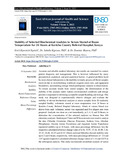| dc.description.abstract | Accurate and reliable medical laboratory test results are essential for correct patient diagnosis and management. This is however influenced by many preanalytical, analytical, and post-analytical factors. A general problem faced by most clinical laboratories is the inability to timely process all blood samples received due to overwhelming workload, reagents stock-outs, and equipment breakdown, necessitating storage which predisposes analytes to deterioration. To ensure accurate results from stored samples, the determination of the stability of the analytes under various environmental conditions and storage periods is important in informing acceptable sample handling and storage. This study was designed to experimentally observe changes and evaluate the stability of eleven biochemical analytes in serum samples from 20 randomly sampled healthy volunteers stored at room temperature over 24 hours at Kericho County Referral Hospital laboratory. 10mls of venous blood was drawn from each volunteer, serum was separated and five aliquot sets were prepared. Analysis was done on a set immediately, at 2, 4, 8, and 24 hours, to determine the concentration of the selected analytes on Human Star 100 chemistry analyser. Student pair T-test and Wilcoxon rank were used to analyse the data. Chloride, Creatinine, Glucose, Potassium, Sodium, Urea, Alkaline Phosphatase, Alanine Amino Transferase and Aspartate Amino Transferase registered stability up to 24 hours, with mean percentage differences less the respective calculated reference change value of 4.54, 35.97, 13.14, 10.89, 2.16, 32.15, 16.48, 42.25 and 42.52. Direct and total bilirubin showed stability only up to 2 and 4 hours, respectively, with mean percentage differences of -2.6 and 1.07 against respective calculated reference change values of 1.14 and 0.675 in the subsequent analysis. This study recommends immediate analysis of serum for total and direct bilirubin, while electrolytes, enzymatic analytes and other metabolic waste and substrates can be analysed within 24 hours without extra storage precautions. If testing is delayed, then effective storage including a dark room, refrigeration, or freezing, should be applied to maintain analytes stability for reliable results. | en_US |
| dc.subject | Stability, Selected Biochemical, Analytes, Serum ,Stored at Room, Temperature, 24 Hours, Referral Hospital | en_US |

